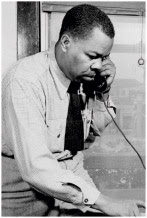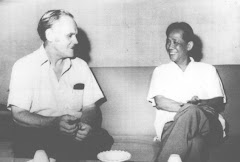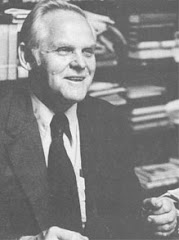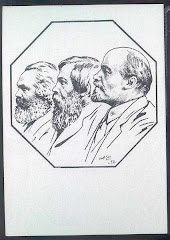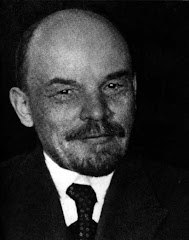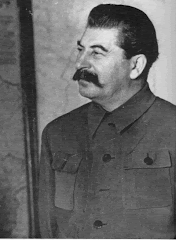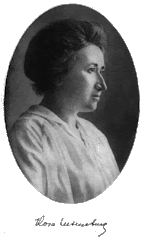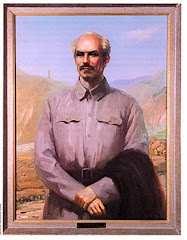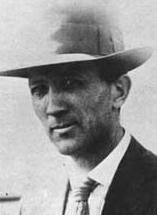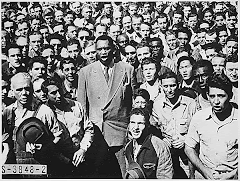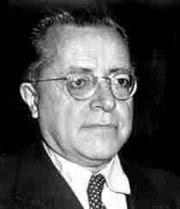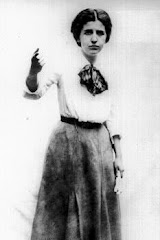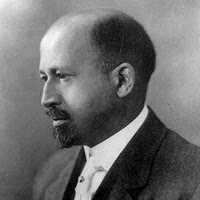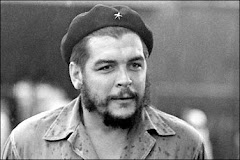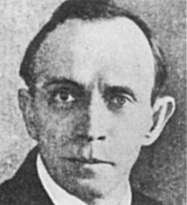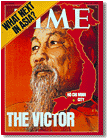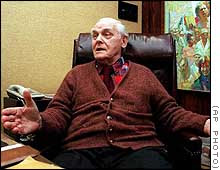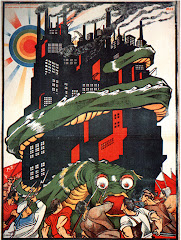A comment: For many years Erwin Marquit, the distinguished professor of physics from the University of Minnesota, dabbled in trying to teach Marxism to students. In the words of one student--- David Bednarczuk who now Chairs the Board of Mesaba Co-op Park--- "Professor Marquit put everyone to sleep, and left everyone wondering what the heck he was talking about."
Overcoming Unscientific Concepts of "Working Class"
A response by Alan L. Maki,
I have never seen such a gross distortion (see essay below from Political Affairs magazine) of Marxism and definition of class together with such a false conclusion in my entire life.
 Surely this buffoon is not a Communist; he is an egg-head.
Surely this buffoon is not a Communist; he is an egg-head.The conclusion arrived at gives away the author’s intent to set up a strawman to knock down in order to produce an excuse for the most crass and bankrupt form of revisionism for this writer, and the CPUSA mis-leadership, to use as an excuse to withdraw from the class struggle.
The only real idea that has been enforced in my having read this essay is that I must remember to always read the writer’s final conclusion before reading the entire article; lest I waste my time.
Marquit concludes: “Marxist political parties should not focus policies of labor concentration on levels of production of surplus value. Rather they should seek those sectors of the economy where the living and working conditions of the workers, and the character of socialization of the labor process, enable the greatest number of workers to be brought into militant class struggle.”
Please Professor Marquit, provide a concrete example of what workers you think the Communist Party should be focused on, and what needs to be done. Not a single specific brought forward here, quite typical of revisionism. In fact, like so much coming from the leadership of the CPUSA these days; here we have one more text-book case of revisionism.
When and where has any communist party ever focused “policies of labor concentration on levels of production of surplus value”? I would like for Professor Marquit to name just one instance of this.
Obviously, Professor Marquit has taken us through a completely meaningless exercise and pointless ramblings in order to tell us that our policy of “industrial concentration” is no longer correct or relevant. Any honest theoretician would have used this as the opening to this itsy-pitsy. Really, why didn’t Professor Marquit let us know what his real argument was in opposition to as he began his essay? Why such deceitful dishonesty?
In fact, I know of only two Communists in the entire world who have a stated opposition to organizing “unproductive workers;” these two Communists are Professor Marquit, and his side-kick Peter Molenaar--- who told me in front of dozens of people that people employed in casinos “are not workers.” Professor Marquit told me the same thing on at least three occasions.
Only a complete and utter fool would suggest that workers employed in call centers working for a credit card company should be the primary focus of Communist activity. Professor Marquit makes this point to absolve himself of any responsibility for not acting to defend the jobs of workers who now find their livelihoods in jeopardy due to the Ford Motor Company’s projected closing of the St. Paul Ford Twin Cities Assembly Plant. Professor Marquit makes this point knowing that the Communist Parties in India, and not the CPUSA, will have to take up the task of organizing call centers as Professor Marquit sits at his desk fabricating scenarios that have no basis in reality. I seriously doubt Professor Marquit knows where the nearest call center to his home is.
Professor Marquit brings forward these utterly absurd argument to cover up the fact that he is afraid to take socialist ideas into the working class. Socialist concepts concerning “ownership;” and bringing forward ideas like public ownership and nationalization
Professor Marquit, do you have an inkling of what needs to be done after providing us with this “analysis?”
Since you don’t have any ideas; I do. I would suggest that the key to uniting the working class--- productive and unproductive workers--- is to focus on winning a real living--- non-poverty--- minimum wage which would see federal legislation enacted keeping the minimum wage tied to the calculations of the United States Department of Labor and its Bureau of Labor Statistics--- taking into consideration the real cost of living as articulated by the United Nations Universal Declaration of Human Rights of what working people are entitled to by birth. December 10, 2008 marks the 60th Anniversary of this Declaration… I think perhaps the Communist Manifesto has an Anniversary this year, also. It would be kind of unique if the working class had a few think-tanks and action committees working on a project… you know, a Communist Party club is supposed to be like a think-tank and action center of sorts, isn’t it? I’m wondering off point here.
I assume you do agree with me that one of the primary tasks of Communists is to forge the greatest possible unity between “productive” and “unproductive” workers? This is our goal, if I am not mistaken. Of course such unity must have some kind of purpose.
Professor Marquit, must we determine if legislators and the researchers and statisticians are productive or non-productive workers in order to proceed with initiating such struggle over the minimum wage being a real living wage; or, do you think we should just allow bourgeois politicians to continue pulling figures out of the hat at election time?
Apparently the learned professor has not taken the time to read Alan Greenspan’s new book, “The Age of Turbulence” or he would have known that state-monopoly capitalism has prepared for any such attempt by workers to undermine the financial markets; unless of course, Professor Marquit is an advocate of terrorism… and even at this, according to Greenspan, life on earth could be annihilated in a nuclear holocaust and the financial records and market information will be left secure and in good order until the cockroaches learn to push a few buttons.
Oh, Professor Marquit, since you understand that “socialist consciousness” does not arrive in the ranks of the working class spontaneously, what exactly is the Communist Party Club of which you are a member doing to impart socialist ideas among the workers in the Twin Cities? I would think that workers employed in a Plant that a company intends to close over the objections of the workers and the community would be THE PLACE to begin to impart some of these socialist ideas… preferably not the “socialist ideas” that you espouse here because there is already plenty of confusion.
I find it interesting that you would write so many words about “Overcoming Unscientific Concepts of ‘Working Class’" when only you hold to such “unscientific concepts.” In fact, had you not invented these “Unscientific Concepts of ‘Working Class’," we would never have known such “unscientific concepts” even existed… who, but you, has brought forward such “unscientific concepts”?
Where is this great debate you allude to? Only in your own mind is there such a debate. I believe Karl Marx had something to say about that little scientific concept known as “materialism.”
Professor Marquit, you could have at least had the courage to hold up the ideas of Gus Hall concerning “overcoming unscientific concepts of the ‘working class’” to refute; winning a debate against a dead man shouldn’t be as difficult as winning a debate with yourself, which you haven’t faired to well on.
Professor Marquit, why don’t you ask the Canadians to publish this essay of yours in “Spark?”
Actually, some of the Trotskyite publications might look upon your essay very favorably; as would the anarchists. I would be willing to bet Ron Gettelfinger and Bob King are studying every word you have written here. Ford Management might even be interested in having you come to teach your brand of Marxist revisionism at the UAW-Ford-MnScu Training Center. The Chinese capitalists driving around in their new Cadillacs, I bet, are studying this essay thoroughly trying to figure out how they can pound such thinking into the heads of Chinese workers. The whole darn bunch of you can sit around discussing productive vs unproductive labor as the wrecking ball strikes the St. Paul Ford Twin Cities Assembly Plant.
Your perverted translation of the French language for the purpose of twisting and confusing ideas along with your bastardization of the views of the French Communist Party is pathetic.
http://www.politicalaffairs.net/article/articleview/6687/1/325
Overcoming Unscientific Concepts of "Working Class"
By Erwin Marquit
4-01-08, 12:00 pm
Is a computer software designer, for instance, or a waiter in a tourist resort, a member of the working class? Is their labor productive or unproductive? In this paper I address some longstanding prejudices about the class identification of workers employed in the production of nonmaterial commodities or in sectors usually categorized as services. My hope is that a re-examination of some aspects of accepted, and often unquestioned, definitions of the terms working class and productive versus unproductive labor will give a sharper focus to current political decisions.
Marxist political parties have historically considered the working class as their class basis and have oriented their policies primarily on the interests of this class. They have paid, and continue to pay, special attention to recruiting members from the working class and concentrate on mobilizing these workers for the class struggle in defense of their interests. This traditional working class, however, constitutes only one part of those who, not possessing their own means of production, are forced to sell their labor power to sustain themselves and their families.
The distinction made by Marx between productive and unproductive labor has long served as a key to the class identification of those earning wages and salaries. Marx used the term productive labor to describe the labor that gives rise to surplus value – the unpaid labor appropriated from the worker’s labor by the capitalist. Marx and Engels concluded very early on that the working class (or proletariat, to use their preferred term) would form the core of the revolutionary movement for the transformation of society from capitalism to socialism because their objective class character placed the members of this class in an irreconcilable conflict of interest with the bourgeoisie:
The mode of production of material life conditions the general process of social, political and intellectual life. It is not the consciousness of men that determines their existence, but their social existence that determines their consciousness.
The revolutionary Marxist movements have, therefore, focused on bringing a socialist consciousness to the proletariat, knowing that such a socialist consciousness expresses the objective class interest arising from the material conditions of life of the proletarians. No other class in a society dominated by the capitalist mode of production has such a clear-cut material interest in the replacement of capitalism by socialism.
A socialist consciousness does not emerge spontaneously from the class struggles of the proletariat. Experiences acquired by workers through participation in class struggles facilitate their understanding of the dynamics of the social forces at work in capitalist society. A socialist consciousness can then be awakened in them by supplementing their class-struggle experiences with theoretical education provided by the political parties of the working class on the true nature of exploitation by capital. This scientific understanding of the process of societal development is necessary because the working class does not accumulate material resources for seizing power from the bourgeoisie as the bourgeoisie was able to do in effect the transition from feudalism. Only masses of workers organized as a material force can form the basis for the transition from capitalism to socialism. “Material force,” wrote the young Marx, “must be overthrown by material force; but theory becomes a material force as soon as it has gripped the masses.” During the lifetimes of Marx and Engels, and well into the twentieth century, the industrial proletariat formed the overwhelming majority of those sections of the proletariat participating in organized class struggle. As a result, revolutionary Marxist organizations concentrated their activities around the struggles of the industrial proletariat.
This focus on the industrial proletariat has led to a tendency in some Communist parties to regard only industrial workers as proletarians. It was this definition of working class that led the French Communist Party, at its 29th Congress in 1996, to declare that it was dropping the “working class” as the class basis of the Party. The reason it gave was that the working class no longer constituted the majority of wage earners. The French Communist Party applied the term worker (ouvrier) to manual industrial workers and distinguished them from wage earners (salariés), applying this latter term to nonindustrial wage earners.
Another question of class identity arises with the great increase in the number of workers employed in the knowledge and information branches of the economy as well as in the service sector. Do these workers have the same class interest as industrial workers? The answer is not self-evident. It is useful in this context to consider the class character of several types of wage earners who are not industrial workers. Here is how Karl Marx defined productive workers:
Since the direct purpose and the actual product of capitalist production is surplus value, only such labour is productive, and only such an exerter of labour capacity is a productive worker, as directly produces surplus value.
Thus Marx’s sole criterion for what constitutes productive labor under the capitalist mode of production is the labor performed under conditions in which surplus value is appropriated by the capitalist employer. Any worker whose labor leads to the appropriation of surplus value is a proletarian, or equivalently, a member of the working class. In distinguishing productive from unproductive labor in relation to the production of surplus value, Marx was not characterizing unproductive labor as useless labor.
Let us now consider the distinction between wage earners and proletarians. Are there wage earners who are not proletarians? By wage earner I mean generally a person who is engaged to perform labor by hire. Two principal groups of wage earners need to be considered. One group consists of wage earners within an enterprise who are primarily employed by capital for the extraction or realization of surplus value in the course of producing nonmaterial commodities. We can put aside for the moment the special category of corporate executives or others who are paid annual salaries as direct representatives of the capitalist employer. Wages of most workers are calculated on the basis of the hours worked. When the wages of workers are calculated on a longer period – monthly or yearly, for example – they are often referred to as salaried workers. This terminology can have a bearing on how such workers perceive their class status, but it has no bearing on their objective class identity.
To begin our consideration of workers producing nonmaterial commodities, I will cite Marx’s brief discussion, in which he pointed out that productive workers were not only industrial workers: He gave as examples “a literary proletarian who produces books ... at the instructions of his publisher,” “a singer ... engaged by an entrepreneur,” “a schoolmaster who is engaged as a wage labourer in an institution along with others” – in brief, people who are employed for wages to perform services that are turned into material or nonmaterial commodities in order to provide surplus value to the person or establishment that employs them.
Marx, however, cautioning against giving too much weight to such capitalist investments, noted, “Here capitalist production is applicable on a very restricted scale.” Today, of course, capital investments in the employment of wage labor for providing material services as commodities (for example, for-profit hospitals and nursing homes, hotels and motels, restaurants and fast-food providers) and various forms of nonmaterial services and products (private schools, computer software, consultancies, systems management) make up a significant portion of all new investment arising in the process of expanded reproduction of capital. The overwhelming majority of wage earners in the industrialized countries, despite the changes in the character of labor, remain productive workers, and as such are part of the working class. Consequently, Communist parties have had, in general, no problem in recognizing the working-class character of wage laborers employed in the production of nonmaterial commodities and services.
Let us consider computer software industry as an example of an industry producing nonmaterial commodities. Produced for sale or exchange, the product of this industry is essentially a nonmaterial commodity, even if its form of transfer is a material object such as a computer disk. It has all the attributes of a commodity. It is produced for sale. It has a use value. The exchange value of a computer program is determined by the socially necessary labor time embodied in its production. The price differs from the exchange value in the same manner as in the case of material commodities. The availability of competitive products can be affected by copyrights in a manner similar to the protection of the right to produce material commodities by patents. It is subject to depreciation – although not by use, but by becoming antiquated with the passage of time. The Internal Revenue Service sets three years as the useful life of computer programs for the purposes of calculating depreciation for tax purposes. The difference between productive and unproductive employees in this industry (that is, between those who produce surplus value and those who do not) can be determined in the same way as in the case of the production of material commodities.
Software companies as well as many companies producing computer hardware frequently have personnel serving as support teams to assist users of their products when the instruction manuals do not suffice. This is not unique to the computer industry, but the scale of such service increased dramatically with its growth because of the large-scale distribution and intrinsic complexity of the product. Moreover the outsourcing of such services has become almost an industry in itself with the establishment of call centers in countries with lower wage costs to serve clients in higher wage countries.
Support workers working for companies that produce computer hardware (a material commodity) or computer software (a nonmaterial commodity) are essentially serving as extensions to the instruction manual that is normally provided with the product. The instruction manual is a component of the product since it can be a necessary component of its use value. As such, the writer of the manual is a productive worker producing a nonmaterial commodity (distinct from the physical aspect of the manual). Even though the product has already been purchased, the availability of the support service is implicit in the purchaser’s understanding of his or her ability to realize the use value of the product. The labor of the support worker, therefore, must be considered part of the socially necessary labor embodied in the production of the commodity, regardless of whether the producing firm charges separately for such support. The labor of the support worker should be regarded as productive labor.
The class character of the labor of what are referred to as service workers – for example, hotel employees – is not as obvious as in the case of software programmers. The dynamics of the extraction of surplus value from the labor of the hotel staff is somewhat different from that in industrial production. If we neglect the labor of the hotel employees not engaged in housekeeping services, we can look at the exchange value of the room rental as primarily consisting of two factors: replacement of depleted constant capital and value added by the labor of the housekeeping staff (which includes, for this purpose, room equipment and maintenance staff). The daily housekeeping can be viewed as replenishment of the disturbed furnishings, which can be considered to be similar to the replacement of depreciated objects of constant capital in industrial production. In industrial production, the replacement of depreciated constant capital does not serve as a source of surplus value, but is transferred to the exchange value of the commodity. In the case of hotel rooms, however, the daily replenishment of the room furnishings to the state needed for room rental has a twofold character. The exchange value represented by replenishment of material objects such as soap, shampoo, body lotions, and other toiletries, and replacement of any worn-out towels, sheets, furniture, etc. (including building depreciation) is transferred to the exchange value of the room rental. The exchange value that represents the socially necessary labor time of the housekeeping staff necessary for the daily replenishment of the condition of the room constitutes another part of the exchange value of the room rental, but is less than the wages paid to the housekeepers for their labor; the difference represents the surplus value extracted from their labor.
I will not attempt here a discussion of the character of the labor of other employees such as porters, staff at the registration desk, bookkeeping staff, and reservation clerks. Each must be examined separately. Although surplus labor time is extracted from all of them, not all of them are producers of surplus value. This will be clearer as we discuss some other types of labor not producing material commodities. The discussion here, however, can readily be applied to custodial workers in rental properties such as apartment and office buildings.
The determination of the productive or unproductive character of service workers in restaurants and other establishments that process and provide food involves more complex theoretical issues. Insofar as the food is prepared on order (or pre-prepared in anticipation of the order), the labor involved in processing the food order can be productive labor if it is done for the purpose of converting capital into surplus value by its processing. The character of the labor involved in taking the order and the handing over the food so prepared to the customer either by the server in a restaurant, or worker at the counter or takeout window and accepting payment for it is not so readily classified if one follows Marx’s discussion of the selling and buying of commodities.
In Capital II and III, Marx discusses the costs of circulation of commodities and commercial profit. Industrial capitalists usually sell their products to merchants, who in turn either sell the commodities to the ultimate consumer or to a succession of other merchants until they are sold to the ultimate consumer. Marx calls the costs incurred here the costs of circulation – Marx’s discussion of the economics of this stage in the process of extended capital reproduction can be readily applied to the case in which the industrial capitalists market their commodities to the ultimate consumer. With the sale of the commodity, the capitalist converts to monetary form the constant and variable capital transferred to the commodity by productive labor, as well as the surplus value extracted from the worker, so that the proceeds can be reinvested as industrial capital in the process of expanded reproduction.
The circulation costs have a twofold character. They may involve necessary operations such as transportation, storage, and any further processing in form so that the ultimate consumer can consume the product’s use value. These extensions of the production process require both constant and variable capital, the variable labor giving rise to additional surplus value. Other circulation costs such as advertising, repackaging in form to promote or facilitate sales to other merchants or to make the product attractive in retail trade, and bookkeeping to maintain the integrity of the capital as the product is bought and sold from merchant to merchant or even to the final consumer, add no value to the commodity. The merchant's profit is obtained from the difference between the exchange value of the commodity and the price paid for it by the merchant. In this way, the capitalist shares with the merchant part of the surplus value that is created by the labor power of the workers employed in the production sphere of the commodity. The circulation costs that do not produce value include the cost of labor employed by the merchant. The wages of the workers employed by the merchant in unproductive labor are similarly derived from reduction of the surplus value retained by the industrial capitalist by the mechanism of difference between exchange value and price. But these workers receive as wages only some fraction of the socially necessary labor time they put at the disposal of the merchant, just as in the case of the industrial worker. The merchant’s exploitation of the labor of the mercantile workers augments the merchant’s profit and facilitates the ability of commercial capital to achieve the average rate of profit without any surplus value being generated by the merchant’s employees. Nevertheless, the merchant’s workers are exploited in the same manner as the employees of the industrial capitalist.
Here is Marx’s summary:
"The difficulty as concerns mercantile wage workers is by no means to explain how they produce direct profits for their employer without creating any direct surplus value (of which profit is but a converted form). This question has, indeed, already been solved in the general analysis of commercial profits. Just as industrial capital makes profit by selling labour embodied and realized in commodities, for which it has not paid any equivalent, so merchant’s capital derives profit from not paying in full to productive capital for all the unpaid labour contained in the commodities (in commodities, in so far as capital invested in their production functions as an aliquot part of the total industrial capital), and by demanding payment for this unpaid portion still contained in the commodities when making a sale. The relation of merchant’s capital to surplus value is different from that of industrial capital. The latter produces surplus value by directly appropriating the unpaid labour of others. The former appropriates a portion of this surplus value by having this portion transferred from industrial capital to itself.
"It is only through its function of realizing values that merchant’s capital acts as capital in the process of reproduction, and hence as functioning capital draws on the surplus value produced by the total capital. The mass of the individual merchant’s profits depends on the mass of capital that he can apply in this process, and he can apply so much more of it in buying and selling, the more the unpaid labour of his clerks. The very function, by virtue of which the merchant’s money becomes capital, is largely done through his employees. The unpaid labour of these clerks, while it does not create surplus value, enables him to appropriate surplus value, which, in effect, amounts to the same thing with respect to this capital. It is, therefore, a source of profit for him."
In Marx’s view, workers in the retail branch of the economy are therefore not productive workers in the sense that they do not generate surplus value for their employers. The nature of their exploitation, however, is so similar to that of productive workers that their class interests should not be considered to be separate from those of industrial workers. Many jobs in commerce (and other branches of the economy such as finance and insurance, not discussed here) are of such a nature.
Marx did not discuss retail store employees in great detail. Their labor can involve a certain degree of productive labor. Imagine a society that has already attained a stage where distribution of the product is based on need rather than profit. Some sort of distributive labor will be necessary to match the needs of the consumer to the products that are available. To the extent that the labor of a retail store employee has this character, it can be considered as the completion of the production process. Whether engaging in productive or unproductive labor, retail store employees have the same class interests as industrial workers.
To return now to the work of food-service employees, we see that insofar as the work involves the transfer of the food from the preparer to the consumer, the labor is productive labor. To the extent the labor involves inducing the potential customer to order one or another type of product, the labor is unproductive.
The last group of workers that I will discuss here comprises workers in the advertising industry. If an industrial capitalist establishes an advertising department within the enterprise, Marx would not consider the labor to contribute to the production of surplus value in the commodity. The constant capital costs and the cost of labor connected with such advertising are not transferred to the commodity, but detract from the surplus value added to the commodity by the productive workers. Suppose, however, the industrial capitalist outsources the advertising to an advertising firm established to provide promotional material to industrial, commercial, or financial enterprises. The promotional material has a use value to the clients of the advertising firm. The use value of advertising is the procurement of sales. Although the promotional material will generally have a material form for transferring its message, it is largely a nonmaterial commodity. Employees of such firms producing promotional material are indeed productive workers in the same manner that software programmers can be productive workers, or, to go back to Marx’s original example, a singer employed by an impresario. Similar arguments can be made for other workers employed in the production of nonmaterial commodities that do not add to the value of commodities produced by firms that “consume” their use values.
The growth of the mass of capital and the accompanying technological development continue to lead to increases in the number of wage earners engaged in productive and unproductive labor. The decline of the relative percentage of workers in the manufacture of material commodities in relation to non-material commodities and the growth of the percentage of workers in involved in unproductive labor have not led to the decline in the percentage of wage earners exploited by capital.
What political conclusion can be drawn from this analysis? Narrow and outdated definitions of working class, and speculation about where the mass of surplus value is produced, cannot guide effective political action. Political parties of the working class must attempt to understand where the character of the labor process lends itself most strongly to the development of advanced concepts of class struggle among the workers. Failure to grasp the common quality of exploitation faced by productive and unproductive workers can lead to the erroneous conclusion that only class struggles in industries producing material commodities have the potential to contribute to social change. A view that arose in United States in the 1980s maintained that almost all surplus value was produced in the mass production industries, so that only strikes in that sector could force capital to make concessions to the working class. In the present, and for the foreseeable future, this view is untenable. If the workers processing credit card transactions were to strike, it would disrupt the capitalist economy more (although their labor is unproductive), and capital would be more concerned, than if an auto works were to strike.
Marxist political parties should not focus policies of labor concentration on levels of production of surplus value. Rather they should seek those sectors of the economy where the living and working conditions of the workers, and the character of socialization of the labor process, enable the greatest number of workers to be brought into militant class struggle.
--Erwin Marquit is a contributing editor of Political Affairs and editor of Nature, Society and Thought. Send your letters to the editor to pa-letters@politicalaffairs.net
******************
Following are a few questions, citations and quotes from a working class friend to help guide discussion of Professor Marquit's "Overcoming Unscientific Concepts of 'Working Class':"
* Are workers in the advertising industry more situated to land blows to capitalism than workers in the industrial sector?
* Would capitalism crash if all the hotel cleaners walked out tomorrow?
* Who are "the front rankers in the class struggle"?
* Are university professors to be equated with workers in basic industries?
* Henry Winston, former leader of the Communist Party USA, using Lenin’s term ’front rankers’, called the workers in basic industries "the front rankers in the class struggle." (Henry Winston, "Class, Race and Black Liberation" 1977, International Publishers)
* Henry Winston said: "Class consciousness must be expanded from its minimum form--the recognition of the common interest of the majority who sell their labor power--to a higher level: the recognition that all who have a common interest in fighting monopoly do not have a common place within the capitalist system from which to carry on that fight.... It is imperative to recognize that while the basic industrial sector has a common interest with the majority of wage workers, it does not have an identical place with them in the system of capitalist exploitation and the struggle against it. Because of its unique position, this sector is decisive in forging the unity of all the diverse segments of wage workers and in forming an alliance between the workers of hand and brain with all the exploited and oppressed... Not only is this industrial nucleus the most cohesive sector of the working class, it is also the greatest direct producer of surplus value, the source of capitalist profits. And, to a greater degree than any of the other producers of surplus value, the ’front rankers’ occupy the central position within the system: they are the ones who, in the struggle for the division of the value they produce, most directly confront the decisive sectors of monopoly. Thus, the influence of the industrial nucleus--the most potent force in the class struggle--is decisive in every aspect of the economic, social and political battle of the exploited and oppressed." (Henry Winston, "Class, Race and Black Liberation, " 1977, International Publishers)
* Winston called the role of the industrial workers to be "the advance detachment providing the unifying center for leadership of all the oppressed and exploited." And he quotes Lenin: "’...by the development of capitalism and the socialization of labor in general...the factory workers play the role only of front rankers, the vanguard.’ (Lenin, "Collected Works, " Vol. 1, pg. 316.)" (Henry Winston, "Class, Race and Black Liberation, " 1977, International Publishers)
* Winston wrote that the growth in "the number of wage and salaried workers in the service areas--clerical, educational, scientific, professional"--does not minimize the role of the industrial working class, those "workers in mass industry and transport...the production and transport core of the working class." (Henry Winston, "Class, Race and Black Liberation, " 1977, International Publishers)
* Winston writes: "as Lenin pointed out, the numerical increase of this stratum (office and professional workers, ’intellectuals, ’ etc...) cannot lend it the characteristics needed for playing the leading unifying role." (Henry Winston, "Class, Race and Black Liberation, " 1977, International Publishers)
* Winston stresses: "The new additions and allies to the working class confirm, not refute, the Marxist-Leninist concept of the role of production workers as the unifying nucleus of the working class. Just as no change in the role of science and technology can put the university on the plane of industry in the class struggle, no change in working-class structure can put the role of scientific, professional, clerical or service workers on the plane of the industrial working class, the leading force in carrying out the mission of the working class as the grave-diggers of capitalism, the builders of socialism." (Henry Winston, "Class, Race and Black Liberation, " 1977, International Publishers)
* Winston writes, it isn't about "’play(ing) favorites, ’ putting one sector of workers over and against others." Policy must be based, not on "subjective ’preferences’ but on the Marxist-Leninist science of class struggle." (Henry Winston, "Class, Race and Black Liberation, " 1977, International Publishers)
* Henry Winston, former leader of the Communist Party USA, called workers in basic industries "the front rankers in the class struggle." (Henry Winston, "Class, Race and Black Liberation, " 1977, International Publishers)
Alan L. Maki
58891 County Road 13
Warroad, Minnesota 56763
Phone: 218-386-2432
Cell phone: 651-587-5541
E-mail: amaki000@centurytel.net
Check out my blog:
Thoughts From Podunk
http://thepodunkblog.blogspot.com/





